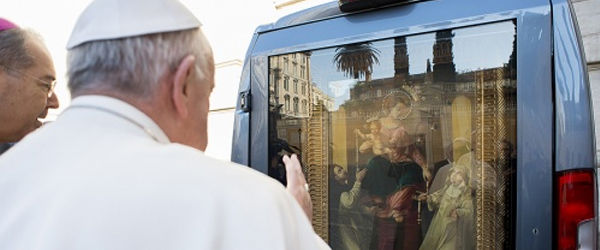“We must remember that intelligence is not enough. Intelligence plus character — that is the goal of true education.” —From “The Purpose of Education,” speech by Rev. Martin Luther King Jr. in 1948 at Morehouse College, Atlanta.By the end of this week, 17-year-old Barbara King will have already visited for the first time several monuments in Washington, D.C. that speak volumes of the history of this country, including the Martin Luther King Jr. Memorial.She and a group of Notre Dame Academy senior classmates and their chaperones also will attend the presidential inauguration Jan. 21. The trip is in compliance with the senior year curriculum, but for Barbara King (not related to Martin Luther King Jr.) it is also a dream come true.“This is a historic moment and I wanted to be part of it,” says the active youth group member at Holy Name of Jesus Church, Los Angeles, who describes herself as an independent, confident person. “There is a correlation between this presidential inauguration and MLK’s dreams. We have come a long way,” she adds, referring to Americans, and African Americans in particular.King, who would like to become a psychiatrist, takes pride in saying that her values were instilled in her by her aunt (who adopted her at an early age together with her younger brother William, a junior at Verbum Dei High School), her teachers at Holy Name School, and the parish community who saw her grow from a little baby to a determined young woman proud of her African American heritage.Her self-confidence is reflected in many young African Americans who plan to attend the 19th annual Martin Luther King Prayer Breakfast, hosted by the African American Center for Evangelization on Jan. 21 at St. Mary’s Academy in Inglewood. One such youth is Jordann Singleton, 18, who has served as an altar boy at his home parish, St. Brigid in South L.A., since he can remember. Now a freshman at the Art Institute of California after graduating from Crespi Carmelite High School in Encino, he grew up surrounded by gospel music being played, sung and danced to by St. Brigid’s mostly African American parishioners.Many of those parish families had arrived in Los Angeles from New Orleans, Mississippi and other southern cities and states seeking a better future based on MLK’s dreams. Years later these parishioners were joined by Latinos, mostly Mexicans, including Singleton’s maternal family.The outgoing Singleton believes that if it were not for the values instilled in him by his family (including his paternal grandmother and great aunts) and the parish community, he would not be so active in church today, where he spends much of his time as a Eucharistic minister and altar server trainer.Although born within a bi-racial family, he has embraced his African American heritage through his closeness with his paternal grandmother who taught him to cook soul food, to love gospel music and to embrace the parish community.His education at Crespi had a huge influence on who he is today, he added.“I am out here living a life of a free black man,” he asserted, calling himself a “living proof” of Martin Luther King’s dreams of justice for all races. Still, he acknowledged, there is still much more work to be done to achieve complete freedom in all areas of life for minorities.Embodying MLK’s idealAs members of the Knights and Daughters of St. Peter Claver, both King and Singleton have attended and volunteered throughout the years at the annual Martin Luther King Prayer Breakfast. They embody the ideal of the late civil rights leader, who delivered many speeches “dreaming” of equality for all — “that my four children will one day live in a nation where they will not be judged by the color of their skin but by the content of their character.”“We have come a long way,” young Barbara King reiterates. Yet while she is very “dedicated to preserving the black culture,” she also likes that she attends a school where she has friends and classmates from other races and cultures. “I’m a very social person who believes in social justice.” Her community involvement also includes being an active member of the Thea Bowman Music Academy, created in 2012 by the African American Center for Evangelization for the purpose of developing musical talent within the young black community. She is a “friend of the library” in her neighborhood, and is part of a group of young girls who socialize with elderly women around knitting lessons.Again, she credits her mother Catherine, director of religious education at Holy Name of Jesus, for instilling solid values. “Belonging to church choir was mandatory,” smiles Barbara. “Church was a big point for my mother.”Says Catherine: “I tried to teach them a sense of responsibility for themselves, for their family, the community and the world. You have to branch out and fight for justice issues.”Of her daughter attending the historic inauguration, she says: “This is a special time where his (MLK’s) dream is coming true: a blending of races, acceptance. We need to know our history, not for conflict, but for a better present and to carve out a better path for our future.”The Martin Luther King Jr. Memorial Breakfast “Reconciling Wisdom, Justice and Love,” takes place Jan. 21 8-11 a.m. at St. Mary’s Academy, Inglewood. Keynote speaker will be C. Vanessa White, assistant professor of Spirituality at Chicago’s Catholic Theological Union. The breakfast will offer live streaming of the presidential inauguration ceremony. For information call Anderson Shaw, AACCFE director, (323) 777-2106.{gallery width=100 height=100}gallery/2013/0118/mlk/{/gallery}

